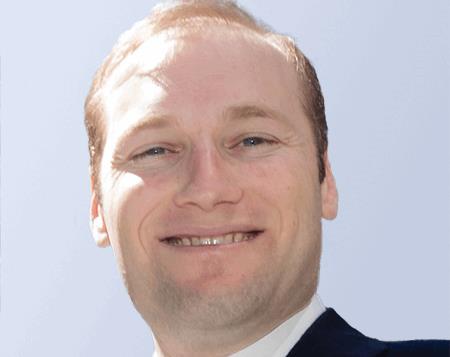Companies To Watch: Ritter Pharmaceuticals
By Wayne Koberstein, Executive Editor, Life Science Leader
Follow Me On Twitter @WayneKoberstein
On a mission to develop the first FDA-approved, durable-efficacy therapeutic for lactose intolerance
SNAPSHOT
 Cofounded by its namesake, Andrew Ritter, Ritter Pharmaceuticals is developing a treatment — not merely a symptom reliever — for lactose intolerance, which has plagued Ritter himself since childhood. It is entering Phase 3 development with a “gut-microbiome modifier” targeted at the condition, and it is in preclinical testing exploring microbiome-based treatments for metabolic syndrome, liver disease, cancer, and other gastrointestinal conditions.
Cofounded by its namesake, Andrew Ritter, Ritter Pharmaceuticals is developing a treatment — not merely a symptom reliever — for lactose intolerance, which has plagued Ritter himself since childhood. It is entering Phase 3 development with a “gut-microbiome modifier” targeted at the condition, and it is in preclinical testing exploring microbiome-based treatments for metabolic syndrome, liver disease, cancer, and other gastrointestinal conditions.
WHAT’S AT STAKE
In the gut alone, an unknown number of conditions may respond favorably to microbiomebased treatments. Initially, most of the new microbiome therapies focused on disorders that primarily affect digestion of food in general. Ritter’s target and founding purpose is more specific and possibly more common than inflammatory bowel disease or colitis. In fact, more than 1 billion people worldwide and over 40 million in the United States alone live with the condition. It is the inability of the small intestine to metabolize the sugar lactose in dairy products, due to the lack of the metabolizing enzyme, lactase. Lactose intolerance can not only produce embarrassing symptoms such as gas, bloating, cramping, and diarrhea, but also lack of weight gain and growth in early childhood and osteoporosis and hypertension in adults from dairy avoidance. The extreme effects of the condition were painfully evident in the youthful years of Andrew Ritter and his twin brother, who then towered above the sickly Andrew. “My twin brother was heavier and bigger than me at that point because I wasn’t getting important nutrients and calcium to grow.” No treatment existed for the young Ritter or contemporaries.
Starting in the eighth grade, Ritter contacted leading lactose intolerance experts such as Drs. W. Allan Walker at Harvard Medical School and Dennis Savaiano, a former dean at Purdue University. “With their guidance and support, using myself as the first test subject, in my garage I formulated and developed our first prototype product, Lactagen, a dietary supplement that ultimately treated my own lactose intolerance.” Ritter says he has been symptom free taking the supplement consistently. He cofounded his company with his father Ira in 2004 and eventually commercialized Lactagen as an over-the-counter product. Lactagen sold well, but its status as a supplement limited the claims the company could make compared to a prescription drug. Thus, in 2008, Ritter and his team began developing a second-generation, prescription version of its product: a different, novel molecule, galacto-oligosaccharide (GOS), coded RP-G28. To dedicate all resources to RP-G28 development, the company took Lactagen off the market. In October 2016, the company announced the last patient visit in its Phase 2b/3 clinical study of RP-G28 and expects to have the results in the first quarter of 2017.
Through “colonic adaptation,” RP-G28 stimulates growth of lactose-metabolizing bacteria in the colon. “We believe this creates a durable treatment whereby you can tolerate dairy products for a long time afterward,” says Ritter. “As you consume dairy products, colonic flora feed off the lactose, so in theory you literally maintain tolerance by consuming dairy.” Avoiding dairy for a long period thereafter or having some type of gut disruption could lead to a loss of tolerance, but retreatment should restore it, he says.
The company has staked everything on RP-G28 for the time being. It foresees leveraging the compound in other therapeutic areas such as metabolic syndrome, liver disease, and IBD. As Ritter says, “Scientific findings from exploring the microbiome are becoming a game changer in the healthcare industry.” Along with the inherent challenge of exploration shared by other companies in the microbiome space, the company’s next steps all depend on the forthcoming clinical data.
Vital Statistics
Employees & Personnel: 16
Headquarters: Los Angeles, CA
Finances
IPO: $20M
Lead Investors
Broadfin, Baker Brothers, Javelin Venture Partners
Other Partners
Aspire Capital Partners and Knoll Capital Management $5M Offering
Latest Updates
October 2016: Concluded dosing and last patient visit in Phase 2b/3 clinical trial of RP-G28 for the treatment of lactose intolerance (data readout expected in Q1 2017).
October 2016: Completed a $5M offering.
June 2016: Issued Method of Use Patent for RP-G28 for treating symptoms associated with lactose intolerance and improving gastrointestinal health.
